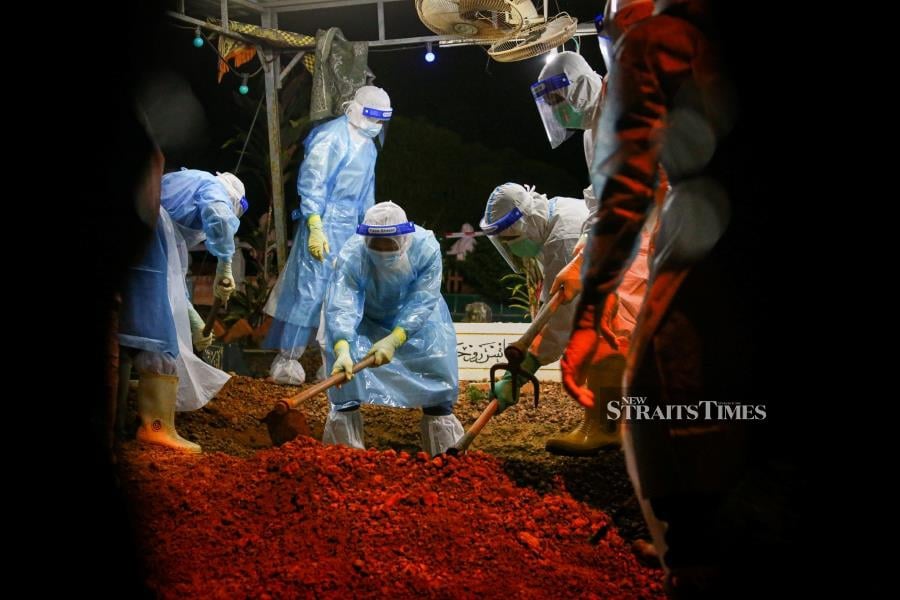Valuing a company you are investing into.
KUALA LUMPUR: Malaysia is seeing an exponential rise in brought-in-dead (BID) cases due to Covid-19 complications, particularly in the Klang Valley region involving those aged 50 and above.
Health director-general Tan Sri Dr Noor Hisham Abdullah advised people to be more vigilant in monitoring their health, especially when they have tested Covid-19 positive and are undergoing home quarantine or self-isolation.
He said an analysis by the National Crisis Preparedness and Response Centre (CPRC) found that there has been a sevenfold increase in BID cases from April (35 cases) to June 2021 (246 cases).
"As of July 2, the ministry recorded a total of 5,327 deaths (0.7 per cent) since the Covid-19 pandemic hit our country.
"A total of 4,856 (91.2 per cent) deaths were reported in 2021. Of the total deaths in 2021, 670 (13.8 per cent) deaths were reported before arrival at the hospital (BID)," he said in a statement today.
He said most BID cases involved victims aged 50 to 70 years (76.7 per cent) with at least a comorbidity (64.5 per cent).
"The highest number of BID cases concerned those aged between 60 and 69 (170), followed by the 50 to 59 age group (130), 70 to 79 (106), 80+ (107), 40 to 49 (85), 30 to 39 (46), 20 to 29 (20) and aged below 20 (six cases)."
Selangor, he said clocked the highest number of BID cases this year at 181 (27 per cent), followed by Kuala Lumpur (78 cases or 11.6 per cent) and Sabah (85 cases or 12.7 per cent).
Other states with BID cases this year were Sarawak (45), Labuan (31), Johor (23), Kelantan (18), Melaka (14), Negri Sembilan (14), Penang (13), Pahang (12), Perak (11), and Kedah (four).
Perlis and Putrajaya registered no BID cases from Jan to July 2, this year.
Dr Noor Hisham advised the public to undergo immediate medical screening and testing if they were symptomatic or have been identified to be a close contact to a positive case.
He also reminded people who were waiting for their test results and calls from the District Health Office (PKD) and Covid-19 Assessment Center (CAC) to self-quarantine at home responsibly.
"Notify the health ministry through self-notification in the MySejahtera application and the nearby District Health Office or CAC if they are found to be positive either through the RT-PCR or RTK Antigen test.
"Immediately report any 'warning signs' and seek treatment at a nearby health facility. Warning signs are symptoms that signal that a Covid-19 patient's condition is getting worse."
Among the warning signs that require immediate treatment, he said, are prolonged fever; breathing difficulties; chest pain; lack of appetite to eat or drink; worsening fatigue; lack of consciousness and confusion; coughing, vomiting and worsening diarrhoea; less urination; lips or fingers becoming bluish; and oxygen saturation
"Family members or housemates are advised to be concerned and sensitive to the condition and health of Covid-19 patients by utilising communication technology to monitor the health of patients throughout the home quarantine monitoring period."
Dr Noor Hisham further said the ministry is also working to improve the monitoring process by CACs nationwide to enable a comprehensive initial assessment to be done immediately on positive cases.
These cases, he said will then be determined whether they can undergo isolation and self-monitoring at home, need to be admitted to the Covid-19 Low-Risk Treatment Center (PRKC) or referred to a hospital.
"With the strengthening of the CAC, better case monitoring can be carried out and immediate referrals can be made if necessary."
Additionally, he said the ministry is working with various parties to increase the capacity of daily SARS-CoV-2 virus detection tests which consist of RT-PCR and RTK-Ag tests.
To increase the capacity of RT-PCR testing, the ministry, he said is collaborating with laboratories from various ministries - Higher Education; Science, Technology and Innovation; Defense - and private laboratories.
RTK-Ag testing is conducted by private clinics and hospitals either individually or by mass screening, he said.
"Cooperation between these agencies and sectors has enabled case detection activities and other public health actions to be implemented promptly."
Dr Noor Hisham added that the ministry would implement a smart device initiative at several CACs including by issuing pulse oxymeters to monitor the current condition of Covid-19 patients while at home.
"As announced by the health ministry, this initiative aims to strengthen the management of Covid-19 patients. With this initiative, the health of patients tested positive, especially those who are undergoing isolation at home, can be better monitored so that any deterioration of symptoms can be detected more quickly."






